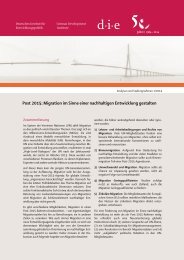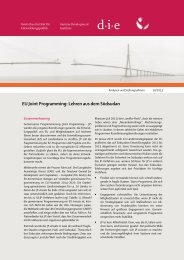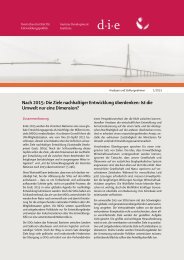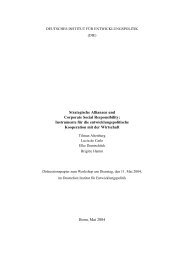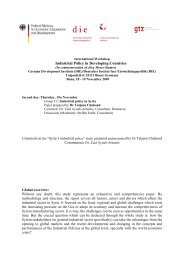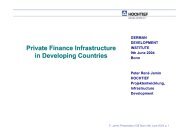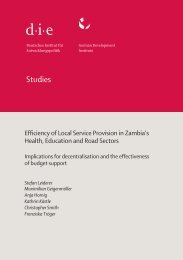Middle East / North Africa and the Millennium Development Goals ...
Middle East / North Africa and the Millennium Development Goals ...
Middle East / North Africa and the Millennium Development Goals ...
You also want an ePaper? Increase the reach of your titles
YUMPU automatically turns print PDFs into web optimized ePapers that Google loves.
5.5 Implementation of MDG8<br />
146<br />
Markus Loewe<br />
The balance of German policy with respect to implementing MDG8 is a<br />
mixed one. On <strong>the</strong> one h<strong>and</strong>, Germany is strongly committed to <strong>the</strong> interests<br />
of <strong>the</strong> developing countries. On <strong>the</strong> o<strong>the</strong>r h<strong>and</strong>, Germany still has<br />
much work to do in adapting <strong>the</strong> scope <strong>and</strong> orientation of its ODA to <strong>the</strong><br />
commitments made in recent years.<br />
The industrialized countries bear <strong>the</strong> chief responsibility for most of <strong>the</strong><br />
targets of MDG8. There are limits to what bilateral DC can do to reaching<br />
<strong>the</strong>m. All of German’s external policies are <strong>the</strong>refore called upon to do<br />
<strong>the</strong>ir part. More than in <strong>the</strong> case of all o<strong>the</strong>r MDGs, MDG8 calls for coherence<br />
between all of <strong>the</strong> external policies of <strong>the</strong> donor countries, mutual<br />
coordination between <strong>the</strong>m, <strong>and</strong> complementarity between <strong>the</strong>ir policies<br />
<strong>and</strong> <strong>the</strong> policies of developing countries. The member countries of <strong>the</strong><br />
European Union (EU) must also take steps to ensure that <strong>the</strong>ir polices are<br />
coherent with <strong>the</strong> policies pursued by <strong>the</strong> Commission.<br />
Accordingly, Germany’s contribution to reaching MDG8 cannot be analyzed<br />
for individual developing countries or regions (e.g. for <strong>the</strong> <strong>Middle</strong><br />
<strong>East</strong> <strong>and</strong> <strong>North</strong> <strong>Africa</strong>; it instead must be viewed exclusively in <strong>the</strong> larger<br />
context, i.e. with all its impacts at <strong>the</strong> global level.<br />
In some sectors Germany has made crucial contributions to ensuring that<br />
progress is in fact made in implementing MDG8. This goes in particular<br />
for international environmental policy <strong>and</strong> debt relief for heavily indebted<br />
poor countries (HIPCs):<br />
– Debt relief (Targets 13 <strong>and</strong> 15): The German government, which has<br />
since repeatedly come out in favor of accelerating <strong>and</strong> enlarging <strong>the</strong><br />
debt-relief process, played an instrumental role in bringing about <strong>the</strong><br />
HIPC Initiative adopted by <strong>the</strong> G7 at <strong>the</strong> 1999 Cologne debt summit.<br />
In <strong>the</strong> MENA region Mauritania has benefited from <strong>the</strong> initiative.<br />
Above <strong>and</strong> beyond <strong>the</strong> HIPC Initiative, Germany has cancelled its bilateral<br />
debt with a good number of countries, which means that today<br />
most HIPCs are without debt with Germany. The main beneficiaries<br />
in <strong>the</strong> MENA region have been Egypt, Syria, <strong>and</strong> Jordan, which have<br />
been relieved of a substantial share of <strong>the</strong>ir German debt (Bundesregierung<br />
2004, 15).<br />
– Good global governance (Target 12): Germany has come out emphatically<br />
for an efficiency-oriented reform of <strong>the</strong> UN system. It has<br />
German <strong>Development</strong> Institute



